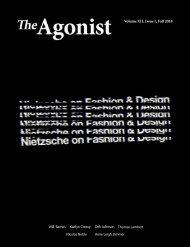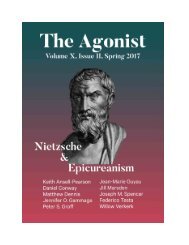Volume XII, Issue II, Spring 2019
Create successful ePaper yourself
Turn your PDF publications into a flip-book with our unique Google optimized e-Paper software.
THE AGONIST<br />
Homo into French—which Strindberg declined, citing financial needs that<br />
Nietzsche could not possibly meet.<br />
When Strindberg received one of Nietzsche’s ‘madness’ notes, he immediately<br />
understood its significance. He replied in kind with both a Greek and a Latin<br />
quotation: “Carissime doctor! qelw, qelw µanhnai!” (Anacreon), meaning “I<br />
will, I will be mad!” A quote from the Latin poet Horace follows: “Better wilt<br />
thou live, Licinus, by neither always pressing out to sea nor too closely hugging<br />
the dangerous shore in cautious fear of storms.” A phrase from Strindberg in<br />
Latin follows: “Meanwhile it is a joy to be mad!” Strindberg’s reply and<br />
translations from the Latin are found in Middleton (1969, 344-45). But Nietzsche<br />
did not follow Horace’s (and Strindberg’s) advice. What may have been initially<br />
‘simulation’ of madness eventually became a fixed condition in which there was<br />
no way back to ‘normal’ life.<br />
It is revealing to note that during the first week of January 1889 when<br />
Nietzsche was sending out his madness notes, he sent several notes to his<br />
publisher C. G. Naumann in Leipzig (KSB, 8:1233,1236,1237). These are brief,<br />
to the point, and without any trace of madness. They give directions to publish<br />
Ecce Homo immediately, prior to Nietzsche contra Wagner, and to return the two<br />
poems that were to end it. “Forward with Ecce!” Nietzsche wrote. Herr Gast was<br />
to be notified of the change of plans. Tellingly, he ends the last note, “Address as<br />
usual, Turin.” Two days before, in his letter to Peter Gast about crossing the<br />
Rubicon, he had said he no longer knew his address, it might be the Palazzo del<br />
Quirinale. In the midst of sending out his ‘mad’ notes, Nietzsche was obviously<br />
at this point capable of writing a perfectly sane one if he wished to do so.<br />
Soon after his arrival in Basel, Nietzsche was transferred to the Psychiatric<br />
Clinic in Jena in order to be near his mother’s home (although she was allowed<br />
to see him only occasionally). He was under the care of Otto Binswanger, a<br />
prominent neuropsychiatrist and specialist in the pathology of neurosyphilis. He<br />
remained in the Clinic [hospital] for fourteen months. During this period the<br />
hospital records, given in detail by Podach (1931, chapts. 5, 6), indicate he was<br />
noisy, often violent, incoherent, apparently in a fully delusional state.<br />
Shortly after admission to the Jena Clinic, Nietzsche was visited by Peter Gast<br />
who did not think he looked too bad. In a letter to their mutual friend Carl Fuchs,<br />
he wrote he had seen Nietzsche in a state that “seemed to him—horrible to say—<br />
as though he were only pretending to be insane, as though he were glad to have<br />
ended this way.” He believed Nietzsche “would be just about as grateful to his<br />
rescuers as somebody who has jumped into the water to drown himself and has<br />
been pulled out by some fool of a coastguard” (Podach 1931, 214). Overbeck<br />
expressed a similar view in a later publication, “I cannot escape the horrible<br />
46









